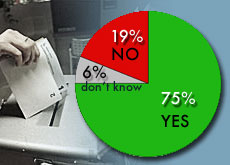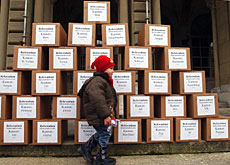Blocher toes government line on citizenship vote

Justice Minister Christoph Blocher has said the government is in favour of easing restrictions on Swiss citizenship for second- and third-generation foreigners.
But Blocher, who is known to be against the proposals, said he would not personally be campaigning for a “yes” vote in a nationwide ballot on September 26.
Blocher – a member of the rightwing Swiss People’s Party – refused on Monday to divulge his personal opinion about the citizenship votes.
But he said he would represent the government’s position only when required to do so.
“As a rule, I am against government campaigns,” he said.
Not in favour
Before his election to the cabinet in December 2003, Blocher voted in parliament against proposals to ease citizenship restrictions.
But as a government minister, he is required to support the collective decision of the seven-member Swiss cabinet, which has come out in favour of making it easier for second- and third-generation foreigners to become Swiss.
Blocher’s party is opposed to the changes, but the three other parties in government – the Social Democrats, Christian Democrats and Radicals – all support the plans.
Blocher stopped short of calling on voters to reform the country’s naturalisation laws, but he pointed out that voters had already turned down similar changes in 1983 and 1994.
He added that the process that leads to naturalisation – and how to reform it – should be carefully considered by voters before they go to the ballot box in September.
Poll results
Last week a poll commissioned by the Swiss Broadcasting Corporation found that a majority of Swiss appear to be in favour of easing citizenship regulations.
Some 75 per cent of those surveyed said they would support a proposal to grant citizenship to children born in Switzerland to foreign parents. Up to 5,000 so-called third-generation foreigners would be eligible for citizenship if the reform is accepted.
A second proposal – also to be voted on next month – to ease naturalisation procedures for young foreigners who have completed at least five years of schooling in Switzerland found support from 68 per cent of those polled.
According to the Federal Office for Immigration, Integration and Emigration, around 116,000 young foreigners living in Switzerland today were either born in the country or have spent at least five years studying in Swiss schools.
The authorities estimate that between 5,000 and 10,000 people would apply for citizenship under the new regulations if the second proposal is accepted.
Path to citizenship
Around 1.5 million foreigners currently live in Switzerland. In 2003, 37,000 people were given Swiss citizenship.
The tortuous naturalisation procedure makes it hard for foreigners – even those born in Switzerland – to be granted Swiss citizenship.
The government argues that making citizenship easier could help foreigners integrate into Swiss society.
Opponents counter that the proposals are simply a ploy to artificially reduce the number of foreigners in Switzerland.
Just over 20 per cent of the population is foreign, although a significant number were born and educated in Switzerland.
swissinfo with agencies
Under the proposals, young foreigners who have attended at least five years of compulsory schooling in Switzerland would be able to apply for citizenship.
Citizenship would be automatic for third-generation immigrants – children whose grandparents came to Switzerland and whose parents have lived in the country for at least five years.
Swiss voters go to the polls on September 26 to decide whether to:
Ease citizenship regulations for second- and third-generation foreigners in Switzerland.
Introduce statutory paid 14-week maternity leave.
Halt closures of state-owned post offices.

In compliance with the JTI standards
More: SWI swissinfo.ch certified by the Journalism Trust Initiative













You can find an overview of ongoing debates with our journalists here . Please join us!
If you want to start a conversation about a topic raised in this article or want to report factual errors, email us at english@swissinfo.ch.